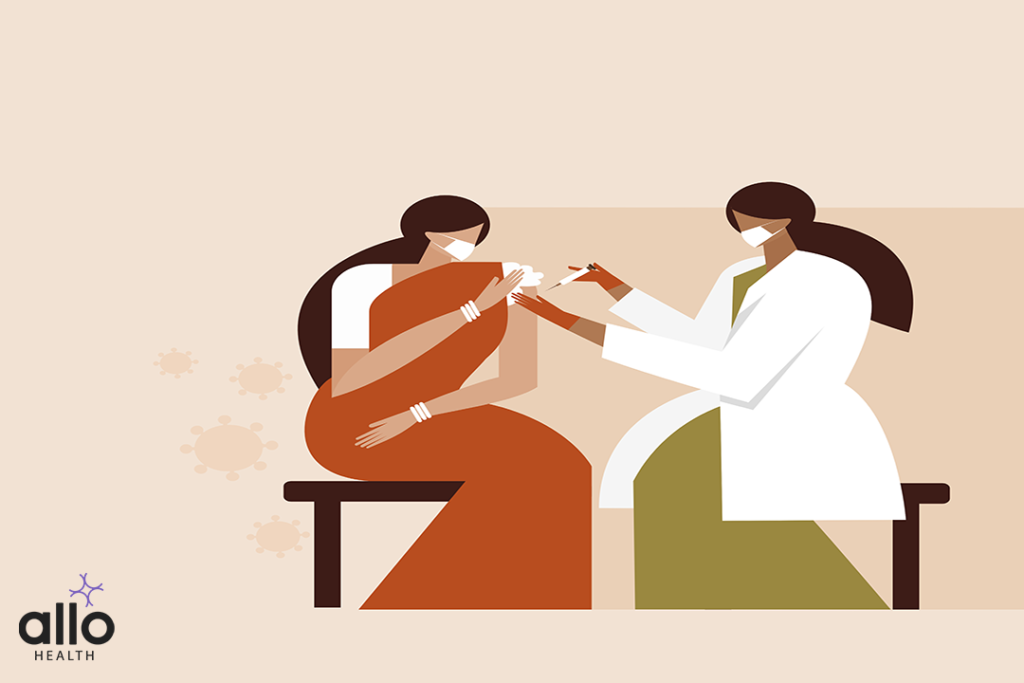Preventative Sexual Wellness: Check-Ups

Allo Health is dedicated to personalized well-being, offering support and trusted information tailored to individual health goals. The platform emphasizes human-generated content, led by a distinguished medical team of experts, including physicians and sexual health specialists. Their commitment to credibility involves rigorous fact-checking, authoritative research, and continuous updates to ensure accurate, up-to-date information. Allo Health's unique approach goes beyond conventional platforms, providing expert-led insights and a continuous commitment to excellence, with user feedback playing a crucial role in shaping the platform's authoritative voice.

Dr.Sanjana holds a MBBS degree from Vydehi Medical Institute and Research Centre, Bangalore. She has extensive experience working in numerous multispeciality hospitals and digital platforms. Her vast knowledge in the field of sexual wellness along with her ability to connect/empathise with her patients makes her guide patients to make informed decisions for themselves.
Why This Was Upated?
Our experts continually monitor the health and wellness space, and we update our articles when new information became available.
Updated on 21 May, 2024
- Article was updated as part of our commitment to diversity, equity, and inclusion.

"The following blog article provides general information and insights on various topics. However, it is important to note that the information presented is not intended as professional advice in any specific field or area. The content of this blog is for general educational and informational purposes only.
Book consultation
The content should not be interpreted as endorsement, recommendation, or guarantee of any product, service, or information mentioned. Readers are solely responsible for the decisions and actions they take based on the information provided in this blog. It is essential to exercise individual judgment, critical thinking, and personal responsibility when applying or implementing any information or suggestions discussed in the blog."
Preventive Sexual Health Care
Preventive sexual health care is a crucial aspect of overall health and wellness. It involves taking steps to prevent sexually transmitted infections (STIs), unplanned pregnancies, and other related health concerns. By being proactive about sexual health, individuals can reduce their risk of contracting or transmitting STIs, as well as other conditions that can impact their reproductive health.
Preventive sexual health care encompasses a variety of practices, including regular STI testing, consistent and correct use of contraception, and communication with sexual partners about sexual health and boundaries. It also involves understanding one’s own body and reproductive health, as well as seeking medical care when necessary.
Taking a proactive approach to sexual health care can have numerous benefits, including improved physical and emotional well-being, increased confidence and self-esteem, and stronger relationships with sexual partners. By prioritizing preventive sexual health care, individuals can take control of their sexual health and lead healthier, happier lives.
Recommended Vaccinations By Age
Vaccinations are an essential aspect of preventive healthcare, offering protection against various diseases. Vaccines provide immunity to several infectious diseases that can be severe and even life-threatening. However, it can be challenging to determine which vaccinations are necessary and at what age they should be administered.
Children and Adolescents (3-18 years)
Children and adolescents require several vaccinations to protect against infectious diseases as they grow. The following vaccines are recommended:
-
DTaP vaccine: As mentioned earlier, 3 doses of DTaP is given at 0,1 and 6 months respectively and 2 booster doses are given- one between 16-18 months and another between 4-6 years
- Human papillomavirus (HPV) vaccine: The HPV vaccine protects against several strains of HPV, which can cause various types of cancer(such as cervical cancer). The vaccine is recommended for both males and females between the ages of 11-12 and up to 26 years of age.
- Meningococcal vaccine: This vaccine protects against meningococcal disease, which can cause meningitis and bloodstream infections. A meningococcal vaccine is recommended for all adolescents between 11-12 years of age, with a booster dose at 16 years of age.
- Influenza vaccine: The flu vaccine is recommended for all individuals aged six months and older, with annual vaccination being recommended.
Adults (19-59 years)
Adults require vaccination against various infectious diseases to maintain good health. The following vaccines are recommended:
- Tdap vaccine: A booster dose of the Tdap vaccine is recommended for adults who have not received a dose since their adolescence or adulthood. This vaccine protects against tetanus, diphtheria, and pertussis.
-
HPV vaccine: As mentioned earlier, the HPV vaccine is recommended for both males and females up to 26 years of age, but may also be recommended for certain individuals between 27-45 years of age, depending on their medical history and risk factors.
- Hepatitis A and B vaccines: These vaccines protect against hepatitis A and B, which can cause liver disease. The vaccines are recommended for individuals who are at increased risk of infection, including healthcare workers, individuals with chronic liver disease
- Influenza vaccine: Annual vaccination against influenza is recommended for all adults, particularly those who are at high risk of complications, such as the elderly and individuals with underlying medical conditions.
- Pneumococcal vaccine: This vaccine protects against pneumococcal disease, which can cause pneumonia, meningitis, and bloodstream infections. The vaccine is recommended for all adults aged 65 and older, as well as for individuals with certain medical conditions.
Older Adults (60+ years)
Older adults are more susceptible to infections and are at higher risk of complications. Therefore, the following vaccinations are recommended:
- Influenza vaccine: Annual vaccination against influenza is recommended for all adults aged 65 and older.
- Pneumococcal vaccine: As mentioned earlier, the pneumococcal vaccine is recommended for all adults aged 65 and older, as well as for individuals with certain medical conditions.
- Shingles vaccine: The shingles vaccine protects against shingles, a painful rash caused by the varicella-zoster virus. The vaccine is recommended for all adults aged 60 and older, with two doses given two to six months apart.
Vaccinations are an essential aspect of preventive healthcare and offer protection against several infectious diseases. The recommended vaccinations for males and females vary based on age and medical history. It is important to follow the recommended vaccination schedule and ensure that you and your loved ones are up-to-date on all recommended vaccines. Consult with your healthcare provider to determine which vaccinations are necessary for you based on your age, medical history, and other risk factors. By staying up-to-date on your vaccinations, you can protect yourself and your loved ones from serious infectious diseases.
Recommended Medical Check-Ups By Age
Regular medical checkups are an essential aspect of maintaining good health and preventing serious illnesses. However, the types of tests and exams required for optimal health can vary depending on age, gender, and overall health. Here are some recommended medical checkups for both males and females, based on their age.
Males
20s and 30s
- Blood pressure test: At least once every two years, as high blood pressure has no symptoms but can lead to serious health concerns like heart disease.
- Cholesterol test: Every five years, to monitor cholesterol levels and prevent heart disease.
- Testicular exam: Men should perform monthly self-exams, and a physician should conduct an exam at least once a year to detect testicular cancer.
40s and 50s
- Prostate cancer screening: Men over 50 should undergo a prostate-specific antigen (PSA) blood test and a digital rectal exam (DRE) to detect prostate cancer.
- Colorectal cancer screening: Starting at age 50, men should undergo a colonoscopy every 10 years to screen for colorectal cancer in the absence of family history.
60s and beyond
- Bone density test: Men over 70 should undergo a bone density test to check for osteoporosis.
- Abdominal aortic aneurysm screening: Men who have a history of smoking or a family history of aneurysms should undergo this screening test to detect an enlarged aorta.
Females
20s and 30s
- Blood pressure test: At least once every two years, as high blood pressure has no symptoms but can lead to serious health concerns like heart disease.
- Cholesterol test: Every five years, to monitor cholesterol levels and prevent heart disease.
- Pap smear: Every three years for sexually active women, to detect early signs of cervical cancer.
- Breast exam: Women should perform monthly self-exams, and a physician should conduct an exam at least once a year to detect breast cancer.
40s and 50s
- Mammogram: Women should undergo a mammogram every one to two years to detect breast cancer.
- Colorectal cancer screening: Starting at age 50, women should undergo a colonoscopy every 10 years to screen for colorectal cancer.
60s and beyond
- Bone density test: Women over 65 should undergo a bone density test to check for osteoporosis.
- Pelvic exam: Women should undergo a pelvic exam every one to three years, depending on their risk factors, to detect gynecological concerns.
Regular medical checkups are crucial for maintaining good health and preventing serious health concerns. It’s important to remember that these recommendations are just general guidelines, and you should consult with your doctor to determine the best medical checkups for your individual needs. By taking a proactive approach to your health, you can improve your overall well-being and live a longer, healthier life.
Protect Your Sexual Health: Recommended Vaccinations
Sexual health is an important aspect of overall well-being, and vaccines can play a crucial role in protecting you against sexually transmitted infections (STIs). Vaccinations have been shown to be effective in reducing the risk of contracting or spreading infections, and they are recommended by healthcare professionals for people of all ages.
Let’s discuss some of the essential vaccinations related to sexual health that you need to know about. By staying informed and taking proactive steps to protect yourself, you can enjoy a healthy and fulfilling sex life without unnecessary risks.
HPV Vaccine
Human Papillomavirus (HPV) is one of the most common sexually transmitted infections, with over 100 different types of the virus. Some strains of HPV can lead to cervical, anal, penile, and throat cancers, while others can cause genital warts. The HPV vaccine is highly effective in preventing infection with the most dangerous strains of the virus.
The Centers for Disease Control and Prevention (CDC) recommends that all boys and girls should receive the HPV vaccine at age 11 or 12. The vaccine can also be given to people up to age 26. In some cases, healthcare professionals may recommend the vaccine for people over 26, especially if they have a higher risk of infection.
Hepatitis A and B Vaccines
Hepatitis A and B are both viral infections that can be transmitted through sexual contact. Hepatitis A can cause fever, nausea, and jaundice, while Hepatitis B can lead to chronic liver disease and liver cancer.
The Hepatitis A and B vaccines are highly effective in preventing these infections. The vaccines are usually given in a series of two or three shots , depending on the vaccine type. The CDC recommends that all adults should receive the Hepatitis B vaccine, and the Hepatitis A vaccine is recommended for people who are at risk of infection, such as travelers to certain parts of the world or people who use injection drugs.
Meningococcal Vaccine
Meningococcal disease is a bacterial infection that can be spread through sexual contact. The disease can cause meningitis, a potentially life-threatening inflammation of the brain and spinal cord, as well as other serious complications.
The Meningococcal vaccine is highly effective in preventing this disease. The vaccine is recommended for people who are at increased risk of infection, such as college students living in dormitories, military personnel, and people who have compromised immune systems.
Syphilis Vaccine
Syphilis is a bacterial infection that can be transmitted through sexual contact. The infection can cause sores, rashes, and other symptoms, and it can lead to serious complications if left untreated.
Currently, there is no vaccine for syphilis. However, the infection can be treated effectively with antibiotics if it is diagnosed early. The best way to protect yourself against syphilis is to practice safe sex and get tested regularly for STIs.
Vaccinations are an essential tool for protecting your sexual health. By staying up-to-date on your vaccines, you can reduce your risk of contracting or spreading sexually transmitted infections. Talk to your healthcare provider to determine which vaccinations are recommended for you based on your age, lifestyle, and health status. Remember, prevention is always better than cure when it comes to sexual health.
Protect Your Sexual Health: Recommended Sexual Health Check-Ups
Sexual health is an essential aspect of our overall well-being. Maintaining good sexual health requires regular check-ups to identify any potential concerns and to take preventive measures. Sexual health experts recommend certain check-ups to keep track of our sexual health.
- Annual physical examination: A regular physical examination can help identify any potential concerns related to sexual health. During the examination, the healthcare provider will check for signs of sexually transmitted infections (STIs), including HIV.
- STI screening: It is recommended that sexually active individuals get tested for STIs regularly. This includes testing for chlamydia, gonorrhea, syphilis, and herpes. These infections can have serious consequences if left untreated, including infertility, chronic pain, and even death.
- Pap smear: Pap smears are recommended for people with a cervix. This test can help detect early signs of cervical cancer. It is recommended that people between the ages of 21 and 65 get a Pap smear every three years, or more often if recommended by their healthcare provider.
- HPV vaccine: The human papillomavirus (HPV) is a sexually transmitted infection that can cause cervical cancer and other types of cancer. The HPV vaccine is recommended for all children aged 11-12 years old, and also for individuals who have not yet received the vaccine.
- Testicular exam: Testicular cancer is one of the most common cancers in men between the ages of 15 and 35. A testicular exam can help detect early signs of testicular cancer, which can be treated successfully if caught early.
- Prostate exam: A prostate exam is recommended for men over the age of 50 or earlier if there is a family history of prostate cancer. The exam involves a digital rectal exam and a prostate-specific antigen (PSA) blood test. Early detection of prostate cancer can increase the chances of successful treatment.
- Contraceptive counseling: Contraceptive counseling is recommended for individuals who are sexually active and not planning a pregnancy. A healthcare provider can provide information about various forms of contraception and help individuals choose the best option for their lifestyle and needs.
- Sexual dysfunction evaluation: Individuals experiencing sexual dysfunction, including erectile dysfunction or premature ejaculation, should consider seeking medical evaluation. Sexual dysfunction can have a negative impact on mental health and relationships, and can also be a sign of underlying health concerns.
Maintaining good sexual health requires regular check-ups and taking preventive measures. The recommended sexual health check-ups include an annual physical examination, STI screening, Pap smear, HPV vaccine, testicular exam, prostate exam, contraceptive counseling, and sexual dysfunction evaluation. By staying up-to-date with these check-ups, individuals can identify and treat any potential concerns early on, ensuring good sexual health and overall well-being






































